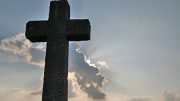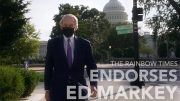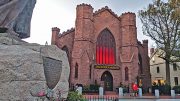
Portland Mayor Michael Brennan reads Pride proclamation to the crowd at Southern Maine’s Pride Festival. Photo credit: Chuck Colbert
By: Chuck Colbert/TRT Reporter–
Even before the Pride Parade marchers stepped off from Monument Square at 12:30 p.m. in downtown Portland, the annual event was — if not a marriage made in heaven — then surely a statewide engagement for same-sex civil wedlock.
For the hundreds of people who made the trek on Saturday, June 16, up Congress Street, down High Street, and into Deering Oaks Park for the celebration of Southern Maine Pride and Festival, the message was unequivocal: Vote ‘Yes” on Election Day, Nov. 6, to make same-sex marriage legal in the Pine Tree State.
And there were plenty of political stars and religious groups participating to drive home the point.
Protections for everyone
Former Governor John E. Baldacci and former Speaker of the House Glenn Cummings, for example, joined the group Catholics for Marriage Equality to offer support.
“I am here because it is an important cause, one I am becoming very familiar with,” Baldacci said. “The Constitution provides protections for all people, and it’s important to be out there raising the flag.”
Bill rejected by voters and outspoken Roman Catholic bishop
Early in 2009 Baldacci signed an equal marriage bill into law, but voters rejected it by a slim margin in a people’s veto referendum.
At the time Roman Catholic Bishop Richard J. Malone played a critical and highly visible role in overturning the law.
This time around, the bishop has said the diocese will not champion in the anti-gay marriage campaign.
Nonetheless, the advocacy group Catholics for Marriage Equality continues to embolden the laity just as it did three years ago.
Catholics: An all inclusive God, this time around
Baldacci spoke to that. “Even in our Catholic faith, people are recognizing we need to move toward recognizing all people and all happiness in our community and state,” he said. “I am really pleased with the turn out and the way people are responding.”
“This is the year Catholics are finding their voice and courage in speaking out,” said Anne Underwood, a founder of the group. “We are the Church, and it’s our experience with friends, neighbors, and families that the God we have met through our Church is an all-inclusive God for everyone.”
After all, “God is love,” she said.
Catholics for Marriage proudly marched along with Portland Mayor
This year more than 100 people marched with Catholics for Marriage Equality up from only six persons the previous year. One of them participating in both parades was Portland Mayor Michael F. Brennan, a grand marshal this year.
After the hour-long Parade made its way to the Festival grounds, Brennan told the gathering that one of his first acts as mayor was to join a national coalition of U.S. mayors who support gay marriage.
Wrong side of equality
“The Church has been on the wrong side of the issue of marriage equality,” he said. “But this fall the Catholic people of this state are going to join with all people of faith to become the first state in the country to pass marriage equality” at the ballot box.
This fall voters in Maryland, Minnesota, and Washington State also face same-sex marriage referenda.
“Power of Pride” brought together Maine Pride’s largest celebration ever
The celebration of Southern Maine Pride is in its 26th year. The 2012 theme was “Power of Pride.”
Altogether, 55 marching contingents registered, along with more than 80 groups participating in the Festival, including food and beverage vendors and community groups manning informational booths.
“This is the largest [celebration] ever in Maine’s history,” said Dave Madeau, Parade coordinator and co-chair. “It’s wonderful to see the community support to make this happen.”
Khris Francis served a Festival master of ceremony.
Organizers estimated the crowd to be up to 7,000.
In addition to Mayor Brennan, Portland Police Chief Michael J. Sauschuck served as a grand marshal and Mainers United for Marriage, a coalition organization, was an honorary grand marshal.
“Pride is a great way for people to come together and celebrate our community,” said Matt McTighe, campaign director for Mainers United.
“It’s also time to take stock of the work that we have done. There is a lot to be proud of,” he explained, referring to “the more than 88,000 conversations with Mainers” about marriage equality and the more than a hundred thousand signatures to put the question on the ballot.
Summers’ Ballot question: Anti-equality question, and there is reaction to it
Southern Maine Pride came the day after news broke that state Secretary of State Charlie Summers proposed ballot-question language reading, “Do you want to allow same-sex couples to marry?”
Both sides of the marriage issue, however, voiced criticism of Summers’ proposed wording.
“The question, as currently drafted, falls short,” said McTighe in a press statement issued on Wednesday, June 20. “It fails to address important parts of the initiative that will be on the ballot in November.
“[We] will present our case to the Secretary of State and ask that the question be revised to more accurately reflect the citizen’s initiative that was signed by more than 105,000 Mainers and already certified by the Secretary of State,” McTighe explained.
He was referring to the title, “An Act to Allow Marriage Licenses for Same-Sex Couples and Protect Religious Freedom,” which Summers had approved before signatures were gathered.
Wording the question differently
Mainers United had proposed the following language: “Do you favor a law allowing marriage licenses for same-sex couples that protects religious freedom by ensuring no religion or clergy be required to perform such a marriage in violation of their religious beliefs?”
Future of Gay marriage initiative: civil v. church
In any event, if approved by voters, the gay-marriage initiative would do two things. It would allow marriage licenses for same-sex couples while explicitly protecting religious freedom.
Backers of same-sex marriage believe including religious-liberty language in the question may well enable more people to vote “Yes,” including those who view marriage as sacrament or an inherently religious life-cycle marker.
The issue on the ballot is civil marriage, a matter of civil rights and not one of religious marriage or sacred rites.
Nonetheless, same-sex marriage detractors specifically cite the threat of churches being forced to perform or recognize same-sex marriages as a reason to vote “No.”
More denominations for marriage equality
Sure enough, pro-LGBT religious groups figured prominently in the Parade line up. While Catholics for Marriage Equality was the largest faith-based contingent, other denominations also included Unitarian Universalists, Episcopalians, Lutherans, United Church of Christ, Quakers, and Jews, among others.
Openly gay Rabbi Jared H. Saks of South Portland’s Congregation Bet H’Am joined members from his community to march.
“I am here with the social action committee” from the temple, he said, to show support for “equality, civil rights, love and commitment and all those good things.”
Fellow congregant Rita Kissen said she was “thrilled to bring my Jewish identity and ally identity together for LGBT rights.”
Other contingents represented TD Bank and Bank of America, the ACLU of Maine, Gay & Lesbian Advocates & Defenders, PFLAG Portland Maine, Portland Public Health, Maine Green Independent Party, Maine Democratic Party, GLSEN-Southern Maine, Portland Women’s Rugby Club, and just guys, a men’s social group from Augusta, the state’s capital city.
First-time Parade onlookers Chris Kast and Byron Bartlett voiced optimism about the upcoming vote in November.
“We got married illegally in Maine,” quipped Kast. “When ‘No on [Question] 1, got voted down we were going to get married in Vermont but decided against running away from a place we love.”
“We had a wedding. It looked like a wedding and had a ceremony like a wedding,” he explained. “And we had a bar tab that looked like a wedding. So we are married.”
Public polling optimistic
Recent public opinion polling, at least for now, backs up the couple’s optimism. The Bangor Daily News reported results from a recent survey found that 55 percent of voters supported a law that would allow same-sex couples to marry and “protects religious freedom” by not requiring clergy to perform same-sex marriages. Thirty-six percent of respondents were opposed.
The MassINC Polling Group conducted the polling of 506 likely voters between June 13-14 for Boston public radio station WBUR.
Survey methodology included landline and cell phone telephone interviews, using conventional registration based sampling procedures.
Results were weighted to reflect the demographic and geographic makeup of the electorate based on previous turnout figures and current trends.
The margin of sampling error is +/- 4.4 percent with a 95 percent level of confidence.
© Copyright. Chuck Colbert. All rights reserved.







